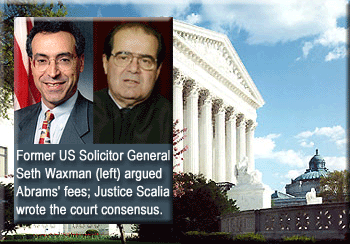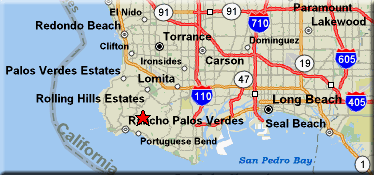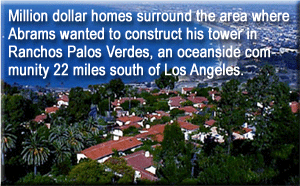|
Supreme Court decision could set back tower siting opportunities
April 1, 2005 -- In a landmark 9-0 decision, the U.S. Supreme Court justices said the federal law that was designed to encourage the growth of the telecommunications industry does not allow cities to be sued for attorneys' fees and damages for refusing to permit a communications tower. The opinion could have wider implications in helping to determine the number and placement of cell phone towers around the country.

Local governments believe that the court's ruling will take some pressure off their zoning officials to approve permits for new cell phone towers. Some site acquisition and zoning specialists believe that it may encourage some communities to be more restrictive with onerous tower-siting requirements. Smaller tower consolidators will have to carefully assess whether they can afford to appeal subjective decisions and restrictions in place to block towers.
The March 22, 2005 decision's history begins in 1989 when homeowner Mark Abrams obtained a permit from the City of Rancho Palos Verdes, CA to construct a 52.5-foot antenna on his property for amateur radio use. He used the guyed tower to support antennas for amateur radio service and to relay signals from other amateur radio operators. He also identified an income opportunity and used his property for commercial SMR purposes.
His problems began in 1998 when he sought permission to construct a second tower. In the course of investigating that application, the City learned that Abrams was using his structure to provide a commercial service, in violation of a City ordinance requiring a "conditional-use permit". On suit by the City, the Los Angeles County Superior Court enjoined him from using the tower for a commercial purpose.
Two weeks later in July of 1999,  the entrepreneurial ham operator applied to the Commission for a conditional-use permit.The application drew strong opposition from several of his neighbors and after two hearings his application was denied. the entrepreneurial ham operator applied to the Commission for a conditional-use permit.The application drew strong opposition from several of his neighbors and after two hearings his application was denied.
On August 24, 2000, he filed an action against the City in District Court, alleging that denial of the use permit violated the limitations placed on the City's zoning authority. In particular, Abrams charged that the City's action discriminated against the mobile relay services he sought to provide.
The District Court did not act on his complaint until January 9, 2002, 15 months after filing, and concluded that the City's denial of a conditional-use permit was not supported by substantial evidence. It ordered the City to grant Abram's application for a conditional-use permit, but refused Abram's request for damages under Section 1983. This section was passed in 1871 and allows people to sue for legal fees and other damages when others have been found to violate the law.
He appealed the decision in order to recoup his mounting legal fees and last year the US 9th Circuit Court of Appeals ruled that under long-standing principles of civil rights law, individuals are free to sue for damages if the government violates their rights. It also stated that under the Telecommunications Act of 1996 providers of wireless phone services have a right to build their networks. This cleared the way for Abrams to sue the city of 42,000 residents to collect attorneys' fees and damages. The city appealed that verdict, arguing that such large money awards weren't envisioned under the Telecommunications Act of 1996.
Telecom dream teams square off
The Supreme Court took up the dispute to decide whether the Telecommunications Act of 1996 allows such damage claims against cities. Abrams, carriers, and association attorneys quickly pooled resources to ensure that communities acted responsibly in reviewing site applications. Washington lawyer Seth Waxman, a former US Solicitor General from 1997 to 2001, and his team represented Abrams and the cell phone companies during oral arguments.
He argued that entrenched zoning authorities were frustrating the creation of a national wireless network. Zoning authorities who were unreasonable in blocking new towers should be faced with damage suits, suggested Waxman. In his court brief he stated that it has long been settled that munipalities may be liable in damages and are required to pay attorney's fees if they violate individuals' federal rights.
The attorney for Rancho Palos Verdes , Washington , DC-based Jeffrey Lamken, told Supreme Court justices that Abrams' attorneys' fees had  already hit $15 million - roughly $3 million more than the annual budget of the city. He argued that if communities faced the prospect of huge damage and fee payments if they wrongly denied a tower application, few would ever say no. "Very few municipalities could ever afford to stand on their rights and enforce local zoning," Lamken said. Lamken had previously served as assistant to the solicitor general in the Office of the Solicitor General of the United States Department of Justice, where he argued 15 cases before the U. S. Supreme Court. already hit $15 million - roughly $3 million more than the annual budget of the city. He argued that if communities faced the prospect of huge damage and fee payments if they wrongly denied a tower application, few would ever say no. "Very few municipalities could ever afford to stand on their rights and enforce local zoning," Lamken said. Lamken had previously served as assistant to the solicitor general in the Office of the Solicitor General of the United States Department of Justice, where he argued 15 cases before the U. S. Supreme Court.
The National League of Cities and the League of California Cities, as well as lawyers for San Diego, Los Angeles and San Francisco, were among those who urged the justices to block damage suits. They said they feared cities could face millions of dollars in damages if they refused a company's bid to build a cell tower. The potential for a crippling verdict could force city officials to automatically approve requests for new cell phone towers, they said.
However, lawyers for the cellular carriers told the court that Congress' goal of creating a national cell phone network cannot be achieved if local officials can use their zoning powers to block towers.
Prior to the supreme court’s March 22, 2005 opinion, it was apparent that the Supreme Court might be favoring the City’s position. During oral arguments Justice Anthony M. Kennedy said, "You are arguing that even the smallest municipality can be held liable for hundreds of thousand of dollars in damages."
"I cannot imagine Congress wanted to impose damages plus attorney's fees upon municipalities without even giving the municipalities the chance to correct their mistakes. You’re saying the municipalities’ appeal system, which is there for people to take advantage of, is just washed out. One mistake at the lowest level and you get damages and you get attorney’s fees. That is extraordinary,” said Justice Antonin Scalia.
Justice Stephen Breyer noted that it would be an “unfortunate outcome,” if local zoning boards, fearful of suits, erred too much on the side of granting these applications.
Rancho Palos Verdes will not have to shell out the green
The Supreme Court justices agreed with Lamken, ruling that when Abrams went to court to reverse the Rancho Palos Verdes' decision, he lost the right to also ask for legal fees and damages because Congress did not allow for legal fees and damages in the Telecommunications Act.
 Writing for the court, Justice Antonin Scalia said Congress did not intend local governments to be liable for huge money verdicts in such disputes. It could have "a particularly severe impact" on small towns and rural communities across the nation if the giants of the cell phone industry could seek money damages and lawyers' fees, he said. Writing for the court, Justice Antonin Scalia said Congress did not intend local governments to be liable for huge money verdicts in such disputes. It could have "a particularly severe impact" on small towns and rural communities across the nation if the giants of the cell phone industry could seek money damages and lawyers' fees, he said.
Cities must give their reasons for refusing to permit new phone towers, Scalia pointed out, and disappointed applicants may go to court to challenge a city's decision. But that is all, he stated. They may not seek monetary damages from the city, even if officials wrongly denied the permit, he said. The Supreme Court's decision written by Justice Scalia is available at: Opinion of the Court . Written by Justice Stephen Breyer, Justices Sandra Day O'Connor, David Souter and Ruth Bader Ginsburg agreed with the court's decision with their concurring statement .
Justice John Paul Stevens provided a stronger concurring opinion , stating, "Congressional silence is surely probative in this case because, despite the fact that awards of damages and attorney's fees could have potentially disastrous consequences for the likely defendants in most private actions under the TCA, nowhere in the course of Congress' lengthy deliberations is there any hint that Congress wanted damages or attorney's fees to be available. That silence reinforces every other clue that we can glean from the statute's text and structure."
All nine Justices agreed with the City's position that damages and fees under Section 1983 were not available. Justice Antonin Scalia's opinion for the Court was joined by seven additional Justices which reversed the Ninth Circuit's ruling. Justices Stephen G. Breyer and John Paul Stevens wrote separate concurring opinions.
"We are delighted with the ruling," said Jeffrey Lamken. "The Telecommunications Act presents many challenges to state and local governments - particularly with respect to the siting and regulation of wireless communications facilities - but it was clear that Congress did not intend to subject them to potentially crippling damages and fee awards when disagreements arise," stated Lamken.
Abrams says he will still seek attorneys' fees and damages
Abrams runs Mobile Relay Associates, which is licensed by the FCC to provide personal wireless services in the Rancho Palos Verdes market. His firm provides a dispatch radio service for police deparments, fire vehicles, taxis, school buses, tow trucks and electricians. It competes with wireless providers such as Nextel, which provide a smilar service, but use different technology. When this dispute began, no other provider in the City offered these services.
In Seth Waxman's brief to the Supreme Court he explained that Congress has determined that municipalities were improperly using their zoning authority to block the provision of wireless services to customers that find those services highly desirable. Under the City's proposed rule, a municipality could obstruct and delay free of cost, even if a federal court ultimately concludes that the municipality's denial of a permit for an antenna violated federal law, he said.
"The cost to one such as Mr. Abrams, however, is very real indeed. In the telecommunications world, a year is a lifetime, but Abrams was forced to wait three years before his federal right to serve his customers was ultimately vindicated by the district court," Waxman explained.
Abrams says he will still continue fighting with five separate law firms working on the case.
Copyright © Wireless Estimator, Inc. Please request reprint permission.
|